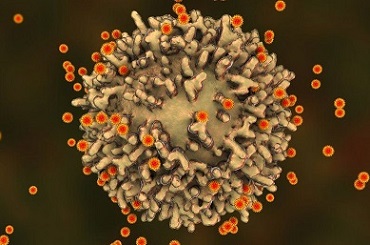BREAKING NEWS! Oxford Study Identifies Five Peptides That Induce HLA-E-Restricted CD8+ T Cell Activity That Is Effective In Inhibiting SARS-CoV-2!
Thailand Medical News Team Aug 17, 2023 1 year, 8 months, 2 days, 23 hours, 10 minutes ago
COVID-19 News: In a groundbreaking revelation that could reshape our understanding of the immune response to SARS-CoV-2, a recent study conducted by researchers at the University of Oxford has unveiled a potential secret weapon hidden within our immune system. This discovery centers around a lesser-known class of molecules that play a pivotal role in distinguishing between "self" and "non-self" within the body's intricate defense mechanisms. The study findings shed light on a series of experiments that may hold the key to halting the commandeering of healthy cells by the SARS-CoV-2 virus.
 Pic Credit: Getty
Pic Credit: Getty
At the heart of this study lies a group of molecules belonging to the human leukocyte antigen (HLA) class of proteins. These proteins are a vital component of the major histocompatibility complex, abbreviated as HLA. The HLA system plays a crucial role in enabling the immune system to differentiate between cells that belong to the body and potential invaders. This complex network of proteins ensures that the immune response is directed against harmful agents while sparing healthy cells from attack.
Within the realm of HLA proteins, distinct classes exist, each found on specific types of cells. For instance, HLA class I molecules are present on the surface of nearly all nucleated cells, while class II molecules are found on diverse cell types including B lymphocytes, dendritic cells, and macrophages. These well-studied HLA groups, known as classical HLA proteins, have long been the focus of research, particularly in the context of organ transplants where the compatibility of HLA antigens is a critical determinant of transplant success.
Interestingly, the Oxford researchers ventured beyond the boundaries of classical HLA molecules to explore the enigmatic HLA-E class. Unlike classical HLA proteins, HLA-E is not downregulated by SARS-CoV-2 infection, suggesting a potential hidden immune response against the virus. HLA-E is expressed on natural killer cells and CD8+ T cells, and it was precisely these HLA-E-restricted CD8+ T cells that the research team set their sights on.
Lead researcher Dr Hongbing Yang and his team delved into blood samples from COVID-19 patients, revealing five specific peptides, or protein fragments, that trigger HLA-E-restricted CD8+ T cell activity. These HLA-E-restricted killer T cells exhibited the potential to recognize and suppress cells infected with the SARS-CoV-2 virus. While prior research and
COVID-19 News reports had shown that SARS-CoV-2 infection suppresses classical HLA proteins to evade immune detection, this study highlighted the resilience of HLA-E and its unique role in orchestrating an immune response against the virus.
Dr Yang told media, "We describe five peptides from SARS-CoV-2 that elicited HLA-E–restricted CD8+ T cell responses in convalescent patients with coronavirus disease 2019. It is possible that the normal balance, which is strongly in favor of classically restricted T cells, is disturbed in SARS-CoV-2 infection and that HLA-E-restricted T cells then could contribute to control of the virus in this infec
tion."
The HLA-E molecules, governed by genes on chromosome 6, are instrumental in coordinating the destruction of cells compromised by replicating viruses. In a controlled laboratory environment, Dr Yang and his colleagues demonstrated that HLA-E-specific CD8+ T cells from COVID-19 patients possessed the ability to identify and suppress viral replication in infected cells. Notably, this suppression was distinct from the downregulation observed in classical HLA molecules by SARS-CoV-2, a mechanism that facilitates the virus's evasion of immune surveillance.
Further detailed investigations revealed that SARS-CoV-2 infection led to the downregulation of classical HLA-Ia on various cell lines, while HLA-E expression remained unaffected. The HLA-E peptide-derived CD8+ T cell clones, characterized by diverse T cell receptors, effectively suppressed viral replication in human lung epithelial cells. This intricate interplay suggests a potential shift in the balance between classical and HLA-E-restricted T cells during SARS-CoV-2 infection, wherein HLA-E-restricted T cells may contribute to controlling the virus.
The implications of this research extend far beyond unraveling the immune response to SARS-CoV-2. The persistence and effectiveness of HLA-E-restricted killer T cells, even in the face of viral infection, suggest a potential avenue for intervention. By bolstering the activity of HLA-E-restricted molecules, researchers may be able to develop targeted vaccines that could prove particularly beneficial for individuals who are immunocompromised, such as the elderly and those with chronic diseases.
Dr Yang concluded that the induction of HLA-E-restricted T cell responses through vaccines focusing on universally presented epitopes could hold significant promise. This novel approach could not only enhance our understanding of the immune response to SARS-CoV-2 but also pave the way for innovative strategies to combat the virus and potentially other viral infections.
In summary, the Oxford study has unveiled a hidden aspect of the immune response to SARS-CoV-2, shedding light on the potential of HLA-E-restricted CD8+ T cells to suppress viral replication. This discovery opens up new avenues for vaccine development and immunotherapy, offering hope for more effective strategies to combat the virus and protect vulnerable populations. As researchers delve deeper into the complexities of the immune system's response to infection, the potential for innovative breakthroughs continues to grow, offering a glimmer of optimism in the ongoing battle against infectious diseases.
The study findings were published in the peer reviewed journal: Science Immunology.
https://www.science.org/doi/10.1126/sciimmunol.abl8881
For the latest
COVID-19 News, keep on logging to Thailand Medical News.
